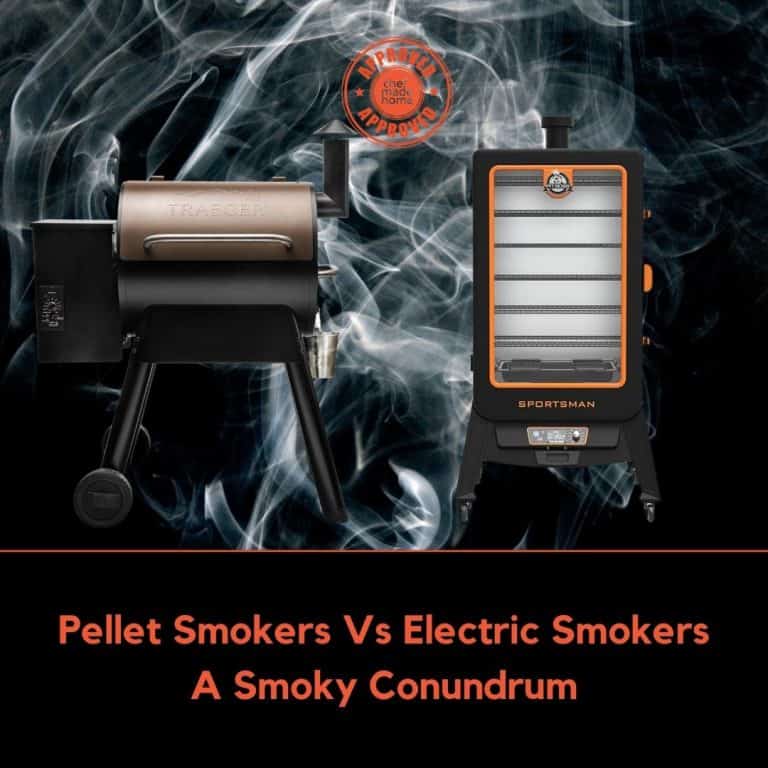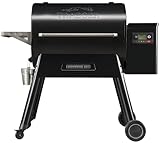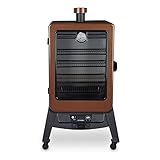Howdy folks, let me toss a question your way: ever find yourself caught in the smoky crossfire between a pellet smoker and an electric smoker? When it comes to smoking food, there are a variety of options to choose from, including pellet and electric smokers. Neither is a traditional backyard grill, and both types of smokers have unique benefits and drawbacks.
Forget the propane and charcoal because these smokers don’t use either to smoke meat and veggies. It can be tough to decide which is the best for your needs.
See, as a seasoned chef with more years under my belt than a hickory tree has rings, I’ve danced with both pellet smokers and electric smokers. I’ve got a few nuggets of wisdom to share about these smoking hot contenders.
So let’s set the stage, folks. We’re going to dive right into this hazy debate. Together, we’ll explore:
What exactly pellet smokers and electric smokers are.
Whether a pellet smoker or an electric smoker takes the crown.
If you can play switcheroo and use pellets in an electric smoker.
How pellet smokers get their groove on and what keeps electric smokers ticking.
So buckle up, it’s gonna be a smoky ride!
20% off first coffee subscription order with code COFFEECLUB20
What Are Pellet Smokers And Electric Smokers?
Let’s kick things off with some basics, shall we?
A pellet smoker, or pellet grill, as the name suggests, is a grilling device that uses compressed hardwood pellets as its fuel. These little compact bad boys are not only the source of heat but also provide that signature smoky flavor that’ll have your taste buds doing the tango.
Picture this: you’re feeding these pellets into a hopper (that’s grill-speak for a storage container), which are then automatically transported into a firepot by an auger. Then the magic happens – they ignite, produce heat, and that smoke you’re after.
In simpler terms, a pellet smoker is like a regular grill that got a major upgrade with automatic temperature control and all.
Now, electric smokers – these fellas are a little different. An electric smoker uses, well, electricity (shocker, I know) as its primary heat source. Inside this magic box, you’ve got electric heating elements, that heat up your wood chips or chunks, producing smoke.
Think of it like turning wood into your own personal smoke factory. The heat isn’t primarily from the burning wood – that’s just for the flavor. It’s the electric coils doing the heavy lifting.
So you see, both pellet grills and electric smokers have their own unique way of doing things, like two chefs with their own secret recipes.
But the question remains – who cooks up the tastier meal? Or in our case, the smokier meal! Stick around as we dive deeper into this culinary conundrum.
How Pellet Smokers Work
Okay, folks, let’s roll up our sleeves and get to know our pellet smoker a bit more intimately.
Remember when I said pellet smokers use compressed wood pellets for both heat and flavor? Well, that’s because pellet grills operate a bit like your home’s central heating system – only a helluva lot tastier.
You start by loading your hopper up with those compressed hardwood pellets. From there, an auger – think of it as a little conveyor belt – transports those pellets into the burn pot, where they get ignited by a hot rod. This all happens automatically, so no need to play firefighter here.
What’s genius about these machines is that they regulate their own temperature. Based on the setting you’ve dialed in, the smoker’s control board will adjust the speed at which the auger is feeding those pellets into the fire. Want it hotter? The auger speeds up. Need it a bit cooler? The auger takes a chill pill.
The result? A consistent temperature that doesn’t require you to babysit the grill. Which is pretty darn amazing if you ask me. But remember, each pellet imparts its own unique flavor onto whatever you’re smoking. So whether you’re a hickory hound or an applewood aficionado, there’s a pellet for that.
Next up, let’s take a look at how electric smokers do their thing. Because remember, knowledge is power – and in this case, it could be the difference between a succulent smoked brisket and a hunk of meat that resembles a hockey puck. Trust me, I’ve been there!
How Electric Smokers Work
Now, let’s turn our attention to the electric smokers. These guys are more straightforward, kind of like your grandma’s oven, only with the added bonus of producing smoky, flavorful meat.
At its core, a typical electric smoker uses—you guessed it—electricity as its primary source to create heat. You’ve got heating coils inside that work pretty much like an electric stove, getting hot when you flip the switch.
Now, to get that beautiful, smoky flavor we’re all here for, we use wood. But we’re not chucking logs into this thing. Oh no, my friends. Electric smokers utilize wood chips or small chunks, placed into a designated tray. These wood chips smolder and smoke as they heat up, flavoring your meat like a boss during the smoking process.
The temperature inside the cooking chamber of an electric smoker is controlled with a thermostat or rheostat. Sounds fancy, right? It’s basically just a knob you turn to increase or decrease the heat, so no PhD required. Once you set your desired temperature, the smoker keeps the heat steady, making sure your meat gets cooked evenly without turning into an overcooked mess.
But there’s the rub—since the primary heat source in most electric smokers is the heating coils and not the wood, the flavor may not be as robust as what you’d get from a pellet smoker. We’ll touch more on this as we go.
Alright, now that we’ve laid out the basics and you understand the inner workings of both pellet smokers and electric smokers, let’s step into the ring and see how these two contenders stack up against each other. Don’t worry, no boxing gloves required—I promise!
Pellet Smokers Vs Electric Smokers: A Comparative Analysis
Now that we’ve stripped these smokers down to their nuts and bolts, let’s see how they fare in a head-to-head showdown.
First up, flavor. In the red corner, we have the pellet smoker, dishing out unique, rich, smoky flavors depending on the type of hardwood, or fruitwood, pellets you’re using. If you’re in the camp that believes variety is the spice of life, then pellet smokers are your jam. The possibilities are endless—hickory, maple, apple, mesquite—each one giving your food a distinct taste.
In the blue corner, the electric smoker brings a more subtle smoky flavor to the table. It’s all down to those wood chips or chunks. They’re there for the flavor, not for the heat, and they’ll give your food a hint of smokiness that’s more laid back than in-your-face.
Temperature control is another crucial point. Both pellet grills and electric smokers offer convenience here, maintaining their heat pretty well once you’ve set them. The difference lies in the approach. A Pellet grill will adjust the pellet feed rate to maintain temperature, while electric smokers rely on their thermostats to keep the heat steady.
Let’s talk about versatility. Pellet smokers aren’t just one-trick ponies—they can grill, roast, bake, and of course, smoke. Electric smokers, on the other hand, are specialists. They smoke, and they smoke darn well, but if you want a device that can do more, you might feel a bit limited.
Which one’s right for you? Well, that depends on what you’re after. If you want more intense flavor and versatility, a pellet smoker might be the way to go. But if you’re after something simple, easy-to-use, and you like your flavors subtle, an electric smoker could be just the ticket.
But hold on to your spatulas, folks. We’re not done yet. Let’s dig a bit deeper and explore some of the nitty-gritty, like the negatives of a pellet smoker and whether you can use pellets in an electric smoker. Intrigued? You should be!
The Pros And Cons Of Pellet Smokers
We’re back with pellet smokers, the multitaskers of the smoking world. Let’s bullet-point our way through the highs and lows of these versatile beasts.
Pros of Pellet Smokers
Superior Flavor: When it comes to delivering a full-bodied, smoky flavor, pellet smokers take the crown. The variety of wood pellet types—hickory, apple, maple, and more—gives you the freedom to experiment with unique flavor profiles.
Versatility: Pellet grills are the Swiss army knives of smokers. They can smoke, grill, bake, braise—you name it. If culinary experimentation is your game, a pellet smoker could be your perfect match.
Cons of Pellet Smokers
Higher Initial Cost: Generally, pellet smokers carry a heftier price tag compared to electric smokers. If budget is a concern, you might need to think twice.
Ongoing Pellet Costs: Pellet smokers need a steady supply of wood pellets to function, and they can go through quite a lot when cooking at high temperatures. This means additional ongoing costs for keeping your pellet stash topped up.
More Complex, More Maintenance: With their mechanical components (like the auger system), pellet smokers can require more maintenance and are potentially more prone to repairs.
So there you have it, folks—the highs and lows of owning a pellet smoker. Top-notch flavor and versatility come with a higher cost and a little extra TLC. But if you’re a serious foodie with a passion for smoky goodness, it could be a trade-off worth making. But wait—there’s more! Can you use pellets in an electric smoker? Let’s find out next.
The Pros And Cons Of Electric Smokers
If pellet smokers are the all-rounders of the smoking world, then electric smokers are the specialists. Let’s dive into their benefits and limitations, bullet-point style:
Pros of Electric Smokers
Plug-and-Play Convenience: Electric smokers offer simplicity at its finest. Plug it in, set your temperature, add your wood chips, and you’re good to go. Ideal for those who favor a ‘set and forget’ approach to cooking.
Cost-Effective: Generally, electric smokers are easier on the wallet than their pellet counterparts, making them an attractive choice if you’re new to the smoking game or working with a tighter budget.
Ease of Use: With a straightforward operating system, electric smokers are newbie-friendly. Dial in your temperature, add your wood chips, and let the smoker do its thing.
Cons of Electric Smokers
Milder Flavor: Since electric smokers rely on heating coils for the primary heat, they yield a less robust flavor compared to pellet smokers. Electric smokers produce a smoky taste, but it may be subtler than you’d like, especially if you forget to add wood chips during the low and slow cooking.
Limited Versatility: Electric smokers are great at what they do—smoking. But if you’re looking for a multipurpose cooking device, you might find the electric smoker’s skill set a bit narrow.
That’s the lowdown on electric smokers, folks—simple, cost-effective, and easy to use, but with a milder flavor and less versatility. But don’t make your decision just yet. There’s one question left to tackle: can you use pellets instead of chips in an electric smoker? Let’s dig into that next.
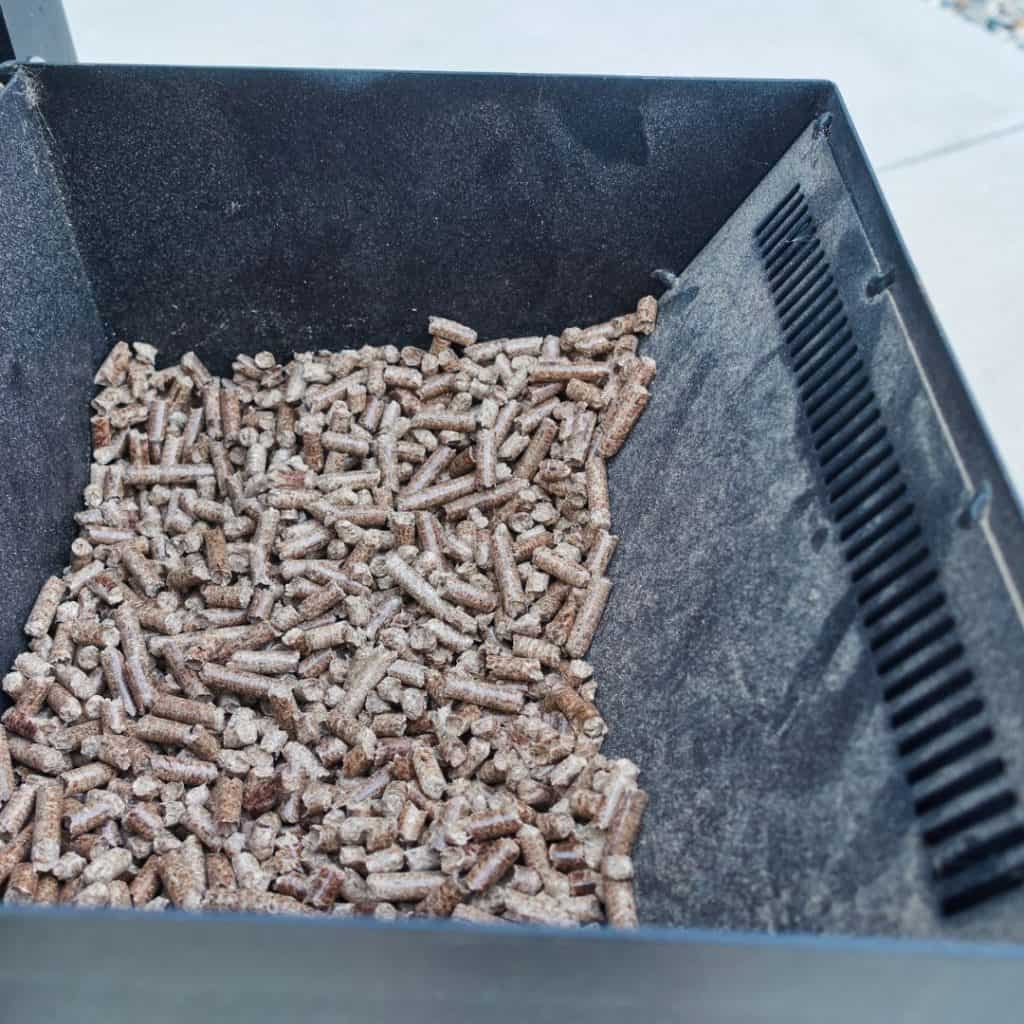
Can You Use Pellets Instead Of Chips In An Electric Smoker?
Alright, you’ve waited patiently, and now it’s time to tackle that burning question: Can you use pellets instead of chips in an electric smoker?
In the world of smoking, there’s always room for a bit of improvisation. However, when it comes to using pellets in an electric smoker, the answer is a bit mixed. Technically, yes, you can use pellets instead of chips in an electric smoker. But, and this is a big but, you have to be careful.
Electric smokers are designed to work with wood chips, not pellets. They have a tray specifically for wood chips that lets them smolder without completely burning up. Pellets, on the other hand, burn hotter and faster. If you chuck them into an electric smoker’s wood chip pan or tray, you might end up with a pile of ash before your ribs are even halfway done.
But, suppose you’re dead set on experimenting with pellets in your electric smoker. In that case, consider using a pellet smoker box or a pellet tube. These are designed to slow down the burn rate of the pellets, giving you that beautiful, slow smoke you’re after.
Remember, switching from chips to pellets will also change the flavor profile of your food. So, if you’re a fan of subtle, laid-back smokiness, swapping your chips for pellets might not be your cup of tea. But if you’re feeling adventurous, why not give it a shot? Just remember to keep an eye on those pellets—they can be a bit of a wild card!
Next up, we’ll dig into another common query: Are wood chips or pellets better for electric smokers? Stay tuned, folks—it’s about to get even more interesting
How Are Pellet Smokers Powered?
Alright, folks, time to get into the nuts and bolts—or should I say pellets and augers—of how a pellet grill is powered. Hang on to your hats because we’re about to embark on a smoking science adventure.
Pellet smokers, despite their old-school, smoky charm, are surprisingly modern when it comes to technology. They’re powered by electricity and use a system that’s as fascinating as it is efficient. Here’s the lowdown:
When you plug in a pellet smoker and switch it on, an electric element heats up, which in turn ignites the wood pellets in the firebox. The star of the show here is the ‘auger’, a spiral-shaped piece of metal that’s responsible for transporting the pellets from the hopper (where the pellets are stored) into the firebox.
The auger’s speed is controlled by a digital controller, which you can adjust to regulate the smoker’s temperature. The faster the auger turns, the more pellets it delivers to the firebox, and the hotter your smoker gets. It’s a bit like adjusting the dial on your stove, except it’s wood pellets and an auger doing the magic.
Remember, though, that because pellet grills are electrically powered, they’re not quite as portable as some other types of smokers. You’ll need a power source to run them, so they’re best suited for home use or places where you have access to electricity.
Now that we’ve covered how pellet smokers work, let’s round out our electric smoker overview showdown with a look at the fuel that electric smokers use. Keep reading, we’re almost at the finish line!
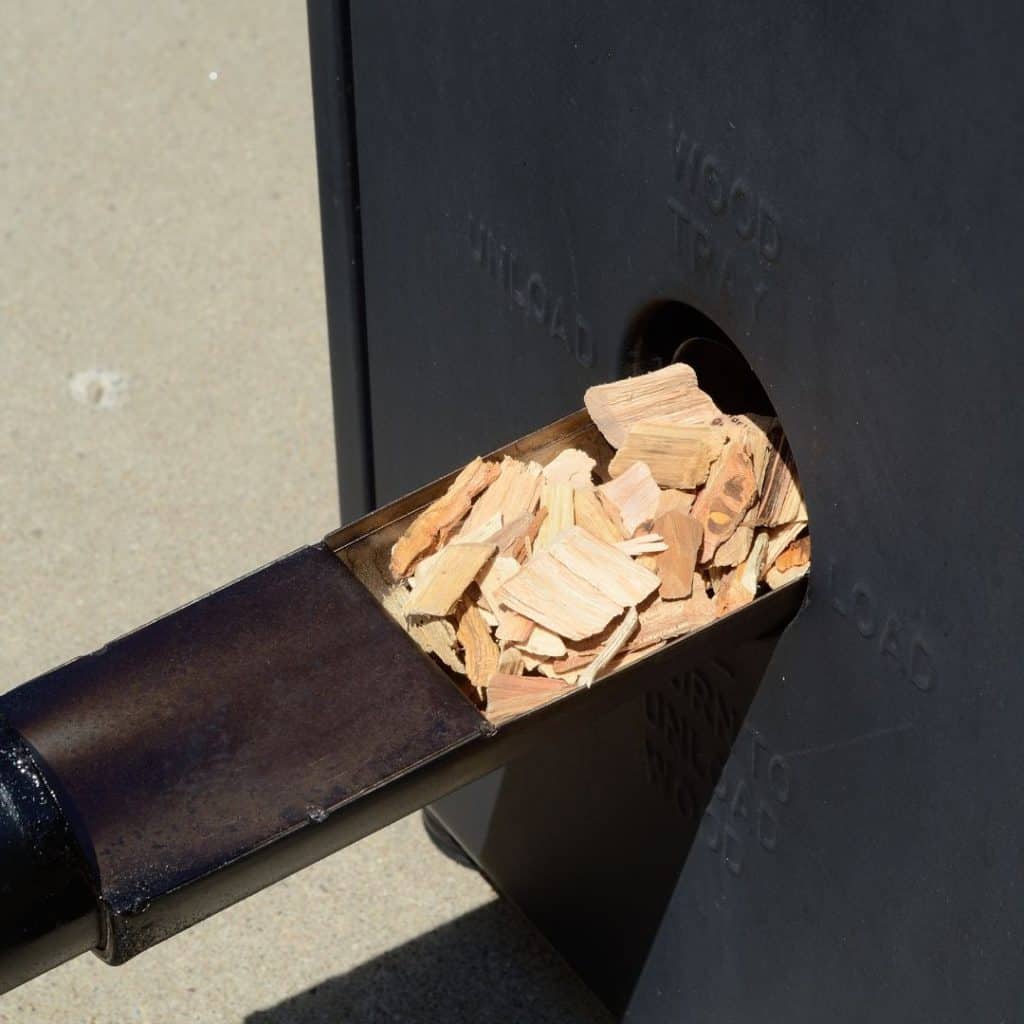
What Fuel Do Electric Smokers Use?
We’ve marveled at the science behind pellet smokers, but what about their electric counterparts? What kind of fuel do they use? Well, folks, the answer is in the name.
Electric smokers use electricity as their primary source of heat. In the heart of an electric smoker lies a heating element, not unlike the ones you’d find in your home oven. This electric heating element is what generates the heat needed to cook and smoke your food.
But hold up—where’s the smoke coming from, you ask? That’s where the wood chips come into play. Electric smokers have a wood chip tray where you add your chosen wood chips. As the smoker heats up, so do the chips, which begin to smolder and produce that delicious, mouthwatering smoke we all love.
The beauty of an electric smoker lies in its simplicity. Plug it in, add your wood chips, set your temperature, and let the smoker do the work. There’s no need for propane, charcoal, or pellets—just electricity and your favorite wood chips.
Keep in mind, though, that like pellet grills, electric smokers need a power source, which can limit their portability. But for at-home smoking, they’re a hassle-free and user-friendly choice.
Well, folks, we’ve journeyed through the ins and outs of pellet smokers vs. electric smokers, tackling everything from flavor profiles to fuel types. All that’s left is to wrap things up with some key takeaways. Are you ready? Let’s roll out the finish line.
Which One Is Better For You?
We’ve grilled through the nitty-gritty details of pellet smokers vs. electric smokers. But ultimately, the question isn’t so much about which one is objectively better—it’s about which one is better for you. So, let’s break it down:
If you value versatility and flavor: A pellet smoker might be your perfect partner in culinary crime. It can smoke, grill, bake, braise, and more. Plus, it imparts a robust, wood-fired flavor that’s hard to beat.
If you’re all about simplicity and value: An electric smoker could be the way to go. It’s a plug-and-play device that requires minimal setup and monitoring. And while it might not deliver as intense a flavor as a pellet smoker, it still gives you that tasty, smoky goodness at a typically lower price point.
Remember, folks, the best smoker for you depends on your personal preferences, lifestyle, and budget. So take your time, weigh the pros and cons, and choose the one that ticks all your boxes.
And there you have it, a thorough look at pellet smokers vs. electric smokers. But before we sign off, let’s quickly recap some of the key points from our smoky showdown. On to our key takeaways!
The Best Pellet Smokers
The Best Electric Smokers
Key Takeaways
Alright, folks, time to wrap up our journey into the world of pellet smokers vs. electric smokers. Here are some juicy morsels to remember:
Flavor Profiles: A pellet grill will typically create a more noticeable, wood-fired flavor compared to electric smokers, which provide a milder, smoother taste.
Versatility: A Pellet grill can smoke, grill, bake, and more, making them a versatile choice for those who like to mix up their cooking methods.
Simplicity and Cost: Electric smokers are usually more user-friendly and less expensive upfront, making them a solid option for smoking beginners or those on a budget.
Fuel Types: Pellet smokers use compressed wood pellets as fuel, while electric smokers use electricity for heat and wood chips for smoke.
Using Pellets in Electric Smokers: While technically possible, using pellets instead of wood chips in an electric smoker requires extra care and equipment, like a pellet smoker box or tube.
Pellet Smoker Power: Pellet smokers are powered by electricity and use an auger system to transport pellets from the hopper to the firebox, with the speed of the auger regulating the temperature.
There you have it, folks. Whether you’re team pellet smoker or team electric smoker, you’re now armed with the knowledge to make the best choice for your smoking adventures. So what are you waiting for? Fire up those pellet and electric smokers, and let the good times roll!
Frequently Asked Questions
Can I Use An Extension Cord With My Smoker?
Yes, you can use an extension cord with your smoker, be it a pellet or electric model. However, you need to ensure it’s a heavy-duty cord that can handle the smoker’s power demands. Also, keep the cord away from high-traffic areas to prevent tripping or accidents.
How Often Do I Need To Clean My Smoker?
Cleaning frequency depends on how often you use your smoker. But as a general rule, aim to give it a thorough clean after every 4-5 uses. Regular cleaning helps maintain your smoker’s performance and extends its lifespan.
Can I Use Any Type Of Wood Pellets In A Pellet Smoker?
Only use pellets that are specifically designed for a pellet grill. These are usually made from 100% hardwood and are safe to use for cooking. Avoid heating or softwood pellets, as they may contain additives that aren’t safe for food preparation.
- HICKORY WOOD FIRED FLAVOR: Traeger Hickory Hardwood Pellets are great for naturally enhancing beef, chicken, pork, and veggies with full-bodied, bold flavor. So it should come as no surprise that...
- NOT ALL PELLETS ARE CREATED EQUAL: The best wood-fired grill on the market demands the best wood pellets on the market. Real taste doesn’t just happen, it’s tied to quality materials and achieving...
- TRAEGER HAS SPENT YEARS DEVELOPING THE PERFECT PELLET: Our hardwood's unique compact cell structure results in a balanced, dependable burn. Traeger has spent years mastering the development of...
- PAIRS WELL WITH EVERYTHING: Pairs especially well with Beef, Poultry, Pork, Vegetables
- FEATURES: Made in USA, Premium Quality, All-Natural, Clean Burn, No Binders, Low Ash, 20lb Bag. PLEASE NOTE: Pictured with new packaging, you may receive old packaging.
What Type Of Wood Chips Should I Use For My Electric Smoker?
The type of wood chips you use depends on your flavor preference. Different woods impart different flavors to the smoke. For instance, applewood gives a sweet, fruity smoke, while mesquite imparts a strong, earthy flavor. Experiment with different wood types to find your favorite.
Do I Need To Soak The Wood Chips For An Electric Smoker?
Soaking wood chips before use is a widely debated topic. Some believe soaking helps the chips smolder and produce smoke for a longer period. Others argue that chips need to dry out before they start smoking, so soaking merely delays the process. Try both methods and see what works best for you.

